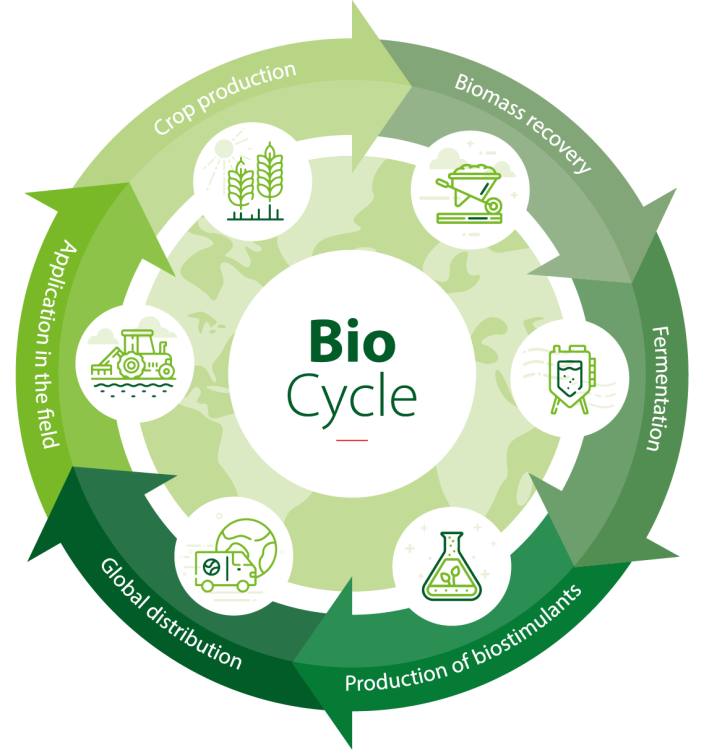Reading Time: 6 minutes

Table of Contents
Melting icecaps, sea level rise, warmer oceans, more severe and more frequent floods and droughts—the effects of climate change are becoming increasingly apparent. Rising temperatures, extreme weather, changes in precipitation patterns, and erosion are all also impacting soil health and plant growth. These in turn affect biodiversity and systems of food production.
To help address these challenges, Ajinomoto AgroSolutions, the agricultural business unit of the Ajinomoto Group in Spain, is combining biotechnology and formulation science to deliver innovative solutions that support sustainable agriculture worldwide.
Biostimulants, a sustainable solution to climate adaptation
Ajinomoto AgroSolutions brings together two specialized teams: Belgium’s Ajinomoto Omnichem, which leverages more than 70 years of expertise in agricultural formulation working solutions like the surfactant Tensiofix® and Spain’s Dadelos AgroSolutions, which has more than two decades of biotech innovation in amino acid-based biostimulants.
The new company is focused on developing sustainable solutions that help farmers address climate challenges, such as soil degradation and rising temperatures by enhancing crop resilience. In partnership with research institutions like the University of Valencia, Ajinomoto AgroSolutions is transforming fermentation-derived co-products into powerful plant biostimulants that regenerate soil and promote more adaptive agriculture.
Tackling big global challenges
Ajinomoto AgroSolutions is playing a leadership role within the Ajinomoto Group by advancing a sustainability-driven agenda in agriculture. Its strategy centers on the development of amino acid-based biostimulants to address urgent global challenges such as climate change, biodiversity loss, and greenhouse gas emissions, while also preparing for new, emerging pressures in food and agriculture systems.
In the face of global supply chain disruptions and economic uncertainty, particularly in Europe, Ajinomoto AgroSolutions aims to contribute to agricultural resilience and efficiency. The 2022 global energy crisis demonstrated how biostimulants can deliver critical efficiency gains, reducing input needs by over 10% on arable land, and even more in developing countries. These gains translate into significant savings in transportation, raw materials, energy, and fuel consumption.
A cornerstone of this approach is the Ajinomoto Group’s bio-cycle philosophy, which transforms fermentation-derived co-products into high-value biostimulants. In FY2021 alone, approximately 20 million kilograms of plant-based co-products were repurposed, reinforcing the company’s commitment to resource efficiency and the circular economy.

What are plant biostimulants?
Plant biostimulants are substances or microorganisms applied to plants, seeds, or soil to improve plant health, development, and productivity. Unlike fertilizers, which supply nutrients, biostimulants stimulate the plant’s natural physiological processes, enhancing nutrient use efficiency, supporting root and shoot development, and increasing tolerance to abiotic stress such as drought, heat, or salinity.
Ajinomoto AgroSolutions’ biostimulants are based on amino acids obtained through fermentation, delivering sustainable and high-performance solutions for agriculture.
Soil health and its impact on plant growth

Climate change is increasingly degrading farmland. Rising temperatures accelerate the decomposition of organic matter, reducing soil fertility and increasing evaporation, which dries out the soil and concentrates pollutants. Intense rainfall and storms can erode topsoil, leach nutrients, and disrupt soil structure. In coastal regions, seawater intrusion into freshwater aquifers further degrades soil quality. Meanwhile, shifting weather patterns affect microbial populations in the soil, altering nutrient cycling, decomposition processes, and overall soil health.
Crops are highly sensitive to temperature fluctuations, with each species having an optimal range for growth. When temperatures rise above this range for prolonged periods, heat stress occurs, compromising germination, inhibiting photosynthesis, and ultimately reducing yields. In this context, improving plant resilience and protecting soil vitality have become essential pillars of sustainable agriculture.
Making plants more heat resistant
Leveraging the Ajinomoto Group’s proprietary “AminoScience” technology, Ajinomoto AgroSolutions has developed biostimulants with prebiotic properties, functioning like a superfood for soil microbes. These formulations help activate key enzymes, regulate salinity, and reduce the presence of harmful compounds such as nitrates and chlorides, leading to healthier soils and improved crop performance.
Additionally, Ajinomoto AgroSolutions’ products support plants under heat stress conditions. By inducing the production of heat shock proteins and antioxidant enzymes, critical molecules that repair cellular damage and maintain function during thermal stress, our exclusive formulations help crops maintain growth and productivity even under rising temperatures.
Alignment with EU and regional sustainability initiatives
Ajinomoto AgroSolutions is aligning its biostimulants strategy with both regional and global sustainability goals, drawing particular inspiration from the European Union’s Farm to Fork strategy. This EU initiative promotes fair, healthy, and environmentally friendly food systems, including a target to achieve 25% organic food production. These priorities strongly align with Ajinomoto AgroSolutions’ mission to support regenerative agriculture and reduce the environmental impact of crop production.
Beyond Europe, Ajinomoto AgroSolutions is also engaged in supporting sustainable practices in developing regions, including several countries in Africa. By working closely with smallholder farmers and communities with limited resources, the company helps facilitate the transition to more resilient and climate-smart agricultural systems, promoting fairness, nutritional security, and lower carbon footprints across the value chain.
Supporting the Ajinomoto Group’s sustainability goals

Ajinomoto AgroSolutions is playing a key role in the Ajinomoto Group’s broader mission to address global social and environmental challenges. Plant biostimulants are central to the Group’s strategy to reduce its environmental impact by 50% by 2030. By transforming fermentation co-products into agricultural inputs, Ajinomoto AgroSolutions reduces the need for virgin raw materials and lowers emissions across the entire crop cycle, cutting down on the use of fertilizers, pesticides, fuel, and water. These solutions also foster soil biodiversity and carbon sequestration, contributing to climate resilience and healthier ecosystems.
In parallel, scientific research is exploring how biostimulants may enhance the nutritional quality of crops, supporting the Ajinomoto Group’s goal of extending healthy life expectancy for one billion people by 2030. By improving the nutritional value of the food we consume and helping make agriculture more sustainable, biostimulants directly contribute to people’s health and overall well-being.






